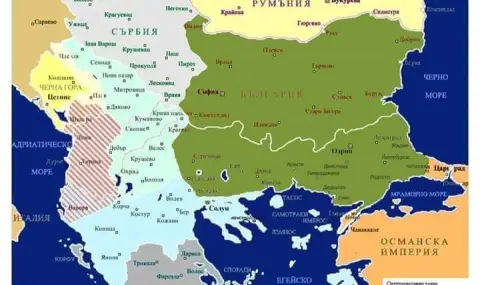The Peace Treaty between the Balkan Allies and the Ottoman Empire is signed in London. The Sultan cedes all territories west of the Median line – Enos and the Aegean Islands. The treaty ends the war, but does not eliminate the military situation in the Balkans. The reason is the tension that arose between the main players in the winning coalition. If a year ago Bulgaria succeeded through diplomacy in creating an effective and successful bloc against the Ottoman Empire, then in the months surrounding the preparation of the peace treaty in London
Sofia falls into international isolation.
The Treaty of London guarantees the creation of an Albanian state, which includes Shkodra. All other issues and claims remain unresolved (the partition of Macedonia, the status of the Aegean islands, war reparations).
The Balkan War (1912–1913) was the culmination of the decades-long efforts of the Bulgarian state to reject the chains of the Berlin Treaty of 1878. Significant territories inhabited by Bulgarians remained outside the borders of the homeland and their unification with the Principality of Bulgaria (from 1908 Kingdom of Bulgaria) and Macedonia became a major task on the agenda of both political parties and society as a whole. The failure of the Ilinden-Preobrazhensky Uprising of 1903 shows that the liberation of Macedonia will only be possible through war. For the successful implementation of this national program, in the period from 1909 to 1912, a series of negotiations were held to establish the Balkan Union. Along with Bulgaria, Serbia, Greece and Montenegro are successively included in it. A significant role in the realization of the union was played by Russian diplomacy, which sees it as a counterweight to the German and Austro-Hungarian influence in the Balkans.
The geographical features and the military-strategic decisions of the warring countries lead to the separation of several theaters of hostilities
in the perimeter between Constantinople, the water area of Varna, Shkodra and Arta (on the Ionian Sea). Attempts by the Ottoman command to gain the strategic initiative in the early days of the war failed, so the terrain and intensity of the battles were dictated by the Allies. The Bulgarian army delivers the main blow in Eastern Thrace. Smaller compounds operate in the Rhodopes and Western Thrace. Bulgarian and Greek troops advanced against Thessaloniki, respectively from the north (along the Struma) and from the south, through the Bistrica valley. The Bulgarian command underestimated the importance of Thessaloniki as a strategic city in drawing the post-war borders between the Allies and allowed a Greek detachment to enter the city first.
After the signing of the London Peace Treaty, relations in the victorious coalition worsened. According to some historians, King Ferdinand, blinded by military successes, ordered on June 16, 1913, our army to attack the until recently allies Greece and Serbia. He is impatient to await the arbitration of the Tsar of Russia.
The consequences are deplorable for Bulgaria.
On June 27, 1913, Romania declared war on Bulgaria and reached Vratsa without almost any resistance. He met the Serbian army at Belogradchik. Vidin is surrounded. The reason is that the main Bulgarian forces are thrown against the Greeks and Serbs.
The Sultan observed the events and on June 30, 1913, ordered his army to occupy Odrinska Thrace.
The impatience of King Ferdinand and the lack of vision among politicians lead us to the first national disaster.
